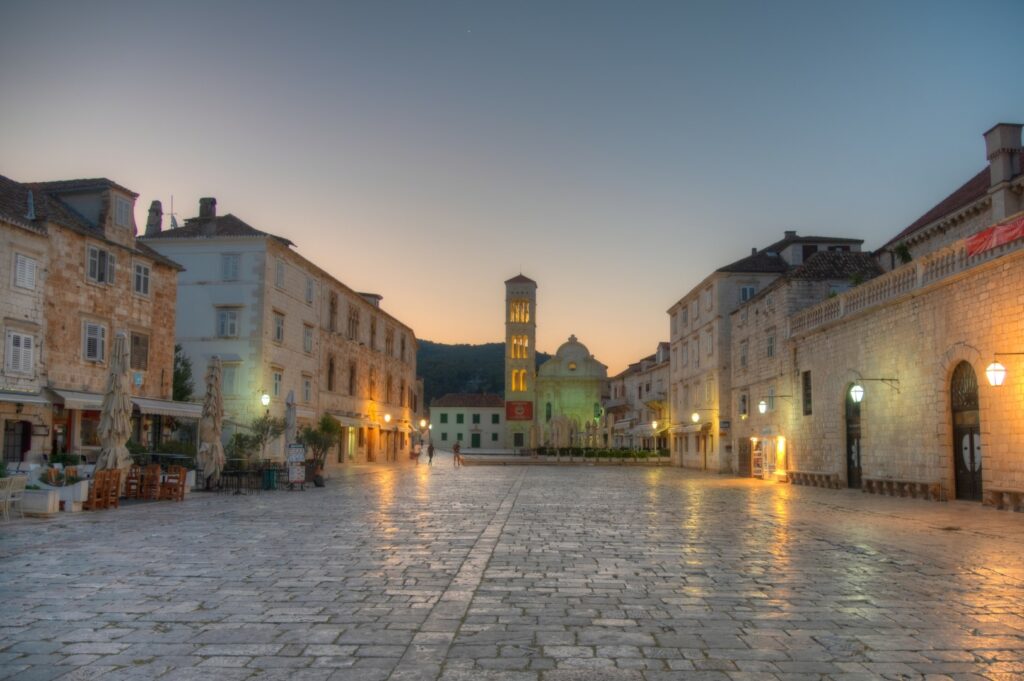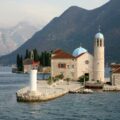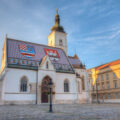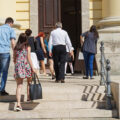Croatia and COVID-19: Divisions on vaccinations and restrictions
Croatia and COVID-19: Divisions on vaccinations and restrictions
During the pandemic, Croatian society has been divided on issues such as vaccinations and restrictions. What was the role of the Church in this debate?
This article is part of our series on the social impact of COVID-19.
Debate on the justification of the ban on movement
The first case of coronavirus in Croatia was recorded on February 20, 2020, when it was stated that a 25-year-old man contracted the virus.[1] As early as March, state councils made decisions to close cultural institutions and ban large public gatherings.[2] In addition, crossing state borders was banned, except for returning Croatian citizens.[3] The adoption of these bans raised the issue of endangering constitutional freedom of movement. Public opinion was quick to ask about people who were exempt from this rule, such as deputies, judges of the Constitutional Court, and diplomats.[4] There was much heated debate on social media about whether such a ban on movement was justified.[5] Furthermore, the debate highlighted certain contradictions of the restrictions, as it prohibited movement within Croatian districts but allowed departure from the country.[6]
The ambiguous attitude of the Church
The Roman Catholic Church in Croatia is the largest religious community and has a great influence on society and public opinion. During the first waves of the pandemic, the Church was very restrained, and many people criticised it for not adhering to the measures prescribed by the state to prevent the spread of the virus.[7] Clergy and bishops in Croatia had different views on the pandemic, so conflicting statements were made to the public. Some bishops supported the position of Pope Francis on the issue of compliance with measures.[8]
The pope was completely clear in calling the faithful to get vaccinated.[9] However, the permanent council of the Croatian Bishops’ Conference issued a statement that all methods of treatment and vaccination must depend on the principle of free will. This statement has been interpreted in various ways.[10]
Whether to support the pope or the anti-vaccine movement
Аnti-vaccine movements interpreted the Croatian Catholic Conference’s message as support for their principles and continued to spread their propaganda.[11] The Croatian cardinal, Josif Bozanić, stated that the Church would respect all measures from the state regarding the pandemic, but that it would continue to serve Mass, which was a clear act against the measures.[12] Even a professor at the Roman Catholic Theological Faculty in Croatia, Ružica Razum, denounced the Croatian state body for fighting the pandemic, and accused it of being in the service of a global conspiracy.[13] Thus, there was a significant part of the Roman Catholic Church in Croatia that did not support anti-pandemic measures.
Some clerics who violated anti-pandemic restrictions received criminal convictions.[14] Public opinion also condemned the Church in the media for multiple violations of measures when it organised large celebrations and gatherings in which even members of parliament participated.[15]
The Roman Catholic Church in Croatia divided in supporting the pope
The Church in Croatia was silent about vaccination for almost a whole year and gave no clear views.[16] Even though the Roman Catholic Church did not have an official stance, Pope Francis had a very clear attitude towards vaccination. He strongly supported getting vaccinated and called it an “act of love.”[17] The Vatican also made a decision that it was no longer possible to enter the Vatican without a COVID-19 pass.[18] However, the Church in Croatia remained silent about the Vatican’s using COVID-19 passes.[19] Croatian Cardinal Josip Bozanić, even after 9,000 deaths in Croatia from the virus, remained silent on the topic of vaccinations.[20]
The church is late with vaccination support
After almost a year of silence and not explicitly inviting believers to be vaccinated, the Roman Catholic Church in Croatia issued a public statement calling on citizens to be vaccinated, but insisted that vaccination be an expression of free will.[21] Shortly after this announcement, the Church issued two more, where it called on the faithful to be vaccinated voluntarily in order to prevent the transmission of the virus in Croatia and to suppress the pandemic as soon as possible.[22]
Although the Church eventually supported vaccination, the question of ethics immediately arose. The Dean of the Faculty of Theology, Vladimir Dugalić, pointed out that there are vaccines that are unethical (Russian, Chinese, and Oxford) because they are made using cells taken from embryos. Believers would commit a passive sin by receiving one of these vaccines. On the other hand, the Dean commented that RNA vaccines are ethical because they are not grown from cells but have been synthesised. Because of this, by taking RNA vaccines, believers would not commit a sin.[23]
Speed of adoption of measures and their implementation
While they were waiting for the advice of the Roman Catholic Church, Croatian society was divided by the pandemic. The measures were strict, but there were exceptions. Some members of the parliament and clergy violated those measures, and anti-vaccine movements saw these violations as support for their ideas. However, in the end, the Roman Catholic Church decided to respect the findings of science and join the pope in calling for vaccination. The media criticised the government and the Church for violating the measures, thereby showing the level of freedom of speech in Croatia even within the extraordinary conditions of the pandemic. The pandemic certainly showed the divisions of Croatian society, but also the strength of the Roman Catholic Church in influencing it.
Want to learn more about similar topics? Go to the EARS Dashboard and receive weekly updates.
Sources
[1] Prvi slučaj koronavirusa u Hrvatskoj
[2] Prije točno godinu dana koronavirus je stigao u Hrvatsku i u potpunosti nam promijenio živote
[3] Odluka o privremenoj zabrani prelaska preko graničnih prijelaza Republike Hrvatske (19. ožujak 2020)
[4] Zabrana kretanja ne vrijedi jednako za sve i to je ozbiljan problem
[5] Pandemija i Ustav Republike Hrvatske
[6] Je li zabrana okupljanja, kretanja i rada teretana u skladu s ustavom?
[7] Je li zabrana okupljanja, kretanja i rada teretana u skladu s ustavom?
[8] Prof. dr. Tonči Matulić: Crkva je trebala oformiti ‘Stožer za pandemiju‘. Govore nestručne osobe, amateri i diletanti… To je kraj zdravog razuma. Sva su cjepiva moralno prihvatljiva!
[9] Dok je papa Franjo potpuno jasan kada govori o pandemiji, Crkva u Hrvatskoj zamuckuje
[10] Prof. dr. Tonči Matulić: Crkva je trebala oformiti ‘Stožer za pandemiju‘. Govore nestručne osobe, amateri i diletanti… To je kraj zdravog razuma. Sva su cjepiva moralno prihvatljiva!
[11] Prof. dr. Tonči Matulić: Crkva je trebala oformiti ‘Stožer za pandemiju‘. Govore nestručne osobe, amateri i diletanti… To je kraj zdravog razuma. Sva su cjepiva moralno prihvatljiva!
[12] Kako će se ponašati crkva tijekom pandemije korona virusa u Hrvatskoj: ‘Poštovat ćemo sve što odluči država, a misa za Uskrs će svakako biti’
[13] Profesorica s KBF-a: Hrvatska je totalitarna, a pandemija je planirana
[14] Podignute krivične prijave protiv pristalica hrvatskog sveštenika
[15] Crkva i Sabor pripremaju najmasovnije kršenje mjera do sada
[16] Crkva je gotovo godinu dana šutjela o cjepivu i covid potvrdama, a onda je izvela kopernikanski obrat: U samo mjesec dana od protivnika prisile do poslušnih pastira u Banskim dvorima
[17] Papa: Vakcinacija je čin ljubavi
[18] U Vatikanu bez Covid potvrde nema plaće, a u Hrvatskoj svećenici šute o cijepljenju: ‘Svatko ima svoje razloge…‘
[19] U Vatikanu bez Covid potvrde nema plaće, a u Hrvatskoj svećenici šute o cijepljenju: ‘Svatko ima svoje razloge…‘
[20] U Vatikanu bez Covid potvrde nema plaće, a u Hrvatskoj svećenici šute o cijepljenju: ‘Svatko ima svoje razloge…‘
[21] Crkva je gotovo godinu dana šutjela o cjepivu i covid potvrdama, a onda je izvela kopernikanski obrat: U samo mjesec dana od protivnika prisile do poslušnih pastira u Banskim dvorima
[22] Crkva je gotovo godinu dana šutjela o cjepivu i covid potvrdama, a onda je izvela kopernikanski obrat: U samo mjesec dana od protivnika prisile do poslušnih pastira u Banskim dvorima
[23] ‘Oxfordsko, rusko i kinesko cjepivo katolicima nisu etički prihvatljiva…’ No, postoji jedan ali…






